|
|
Doing It Because You Can |
September 2006 |
|
In the August 2006 ĺ─˙Lettersĺ─¨ column, readers Michael Zavoski and Scotty Webb responded to our interview with Geoff Emerick (see ĺ─˙Production Values: The Long and Winding Roadĺ─¨ in the May 2006 issue) by debating whether recording and editing in the computer is a boon or an impediment. Zavoski thinks that computer editing detracts from the creative process, and suggests rehearsing until a performance is right so one doesn't have to edit later. Webb believes that the computer's capabilities are a plus, and that a performance doesn't suffer as a result of recording through one.
In this month's ĺ─˙Lettersĺ─¨ (see p. 14), Tom Slocombe says in response to our July 2006 feature ĺ─˙Vocal Magicĺ─¨ that minor inaccuracies are part of what makes a performance human. He thinks the effect of technology is to encourage producers to overedit a performance in an attempt to make it ĺ─˙perfect.ĺ─¨ Like Zavoski, Slocombe advocates using musicians who can nail their parts to begin with.
Zavoski, Webb, and Slocombe are discussing music that is meant to sound as if it is being performed; we're not talking about electronic music that is intended to sound inorganic, and with which it's appropriate to heavily quantize and construct the piece bit by bit or loop by loop. Webb's real point is that the computer is a tool, and what matters isn't the tool but how it is used. Most of us agree that it's better to hire musicians who play a piece correctly the first time, rather than having to fix an inferior performance later in the computer.
Sometimes, however, our options are limited. For instance, the featured artist could be the problem; there are times when you can't obtain or afford the veteran session player you want, so you have to settle for who you can find. In that case, since the point of the project is to produce music by that artist, your only option is to do the best you can with what you have. That might mean comping multiple takes and using products like Antares Auto-Tune to an unpleasant extent.
In addition, you must consider who the client and the intended audience are. You have different demands from a commercial pop project for a label than from a blues band that wants a classic sound. Pop listeners could be unenamored with the human variability that might charm blues fans. With local radio and TV commercial spots, you have to please the client, which might be an ad agency that demands an extremely polished sound. So identify who you are producing the project for and produce appropriately.
That said, it is all too easy to overedit a performance just because you can. The solution should be to focus on musical taste first and foremost and to exercise some self-restraint. A little bit of processing and editing can go a long way. Use quality musicians, and then enhance their performance with tasteful use of software rather than using software to cover up a poor performance or to strive for absolute perfection.
The real question is whether the music is meaningful to the listener and has achieved the creator's artistic goals. If you have those things, then the method used is a technical detail that is of professional interest to other musicians but irrelevant to listeners. |
